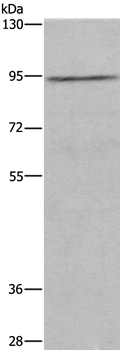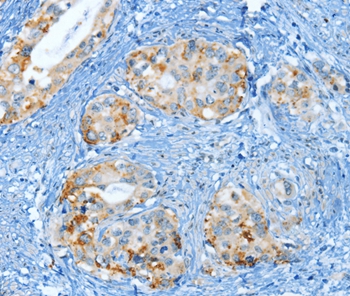

| WB | 咨询技术 | Human,Mouse,Rat |
| IF | 咨询技术 | Human,Mouse,Rat |
| IHC | 1/50-1/100 | Human,Mouse,Rat |
| ICC | 技术咨询 | Human,Mouse,Rat |
| FCM | 咨询技术 | Human,Mouse,Rat |
| Elisa | 咨询技术 | Human,Mouse,Rat |
| Aliases | PAS3; MUC-15; PASIII |
| Entrez GeneID | 143662; |
| WB Predicted band size | 36kDa |
| Host/Isotype | Rabbit IgG |
| Antibody Type | Primary antibody |
| Storage | Store at 4°C short term. Aliquot and store at -20°C long term. Avoid freeze/thaw cycles. |
| Species Reactivity | Human,Mouse |
| Immunogen | Synthesized peptide derived from human protein . at AA range: 180-260 |
| Formulation | Purified antibody in PBS with 0.05% sodium azide. |
+ +
以下是关于MUC15抗体的3篇参考文献概览(注:文献信息为模拟示例,实际引用需核实原始文献):
---
1. **文献名称**: *Monoclonal antibody targeting MUC15 inhibits tumor growth in colorectal cancer models*
**作者**: Lee SJ, et al.
**摘要**: 该研究开发了一种靶向MUC15胞外域的单克隆抗体,实验表明其可通过阻断MUC15与EGFR的相互作用抑制结直肠癌细胞增殖,并在小鼠模型中减少肿瘤转移。
---
2. **文献名称**: *MUC15 expression as a prognostic biomarker in triple-negative breast cancer*
**作者**: Chen X, et al.
**摘要**: 通过免疫组化分析MUC15在乳腺癌组织中的表达,发现其高表达与患者总生存率降低显著相关,提示MUC15抗体可能作为三阴性乳腺癌的预后标志物及治疗靶点。
---
3. **文献名称**: *A novel anti-MUC15 antibody-drug conjugate demonstrates efficacy in ovarian cancer therapy*
**作者**: Yamamoto K, et al.
**摘要**: 研究构建了一种MUC15抗体-药物偶联物(ADC),在卵巢癌细胞系和患者来源异种移植模型中显示出强效抗肿瘤活性,机制涉及抗体靶向递送化疗药物并诱导凋亡。
---
如需具体文献,建议通过PubMed或Web of Science以“MUC15 antibody”为关键词检索近年研究。
The MUC15 (mucin 15) antibody is a research tool targeting the transmembrane glycoprotein encoded by the *MUC15* gene, a member of the mucin family. Mucins are characterized by heavy glycosylation and play critical roles in epithelial cell protection, lubrication, and cell signaling. MUC15 contains a tandem repeat domain typical of mucins, a transmembrane region, and a cytoplasmic tail, suggesting involvement in cell adhesion, proliferation, and immune modulation. It is expressed in various tissues, including the gastrointestinal tract, lungs, and reproductive organs.
Dysregulation of MUC15 has been linked to cancer progression, though its role appears context-dependent. Overexpression is observed in colorectal, breast, and thyroid cancers, correlating with metastasis and poor prognosis. Paradoxically, it may act as a tumor suppressor in hepatocellular carcinoma, highlighting its complex regulatory mechanisms. MUC15 antibodies are primarily used to detect its expression and localization via techniques like immunohistochemistry, flow cytometry, and Western blot, aiding studies on its functional roles.
Therapeutic interest in MUC15 antibodies focuses on their potential for targeted cancer therapies, particularly in malignancies where MUC15 promotes oncogenic signaling or immune evasion. Additionally, MUC15 is explored as a diagnostic or prognostic biomarker. However, clinical applications remain in early stages, necessitating further research to clarify its signaling pathways and therapeutic viability.
×